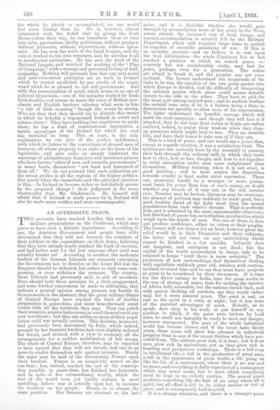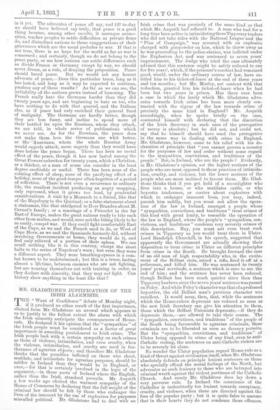AN OPPRESSIVE PEACE. T WO accounts have reached London this week
as to military preparations on the Continent, which may prove to have even a historic importance. According to one, the Austrian Government and people have alike determined that they will not increase the numbers of their soldiers or the expenditure on their Army, believing that they have already nearly reached the limit of exertion, and had better wait fur the last supreme effort until war actually breaks out. According to another, the moderate leaders of the German Liberals are earnestly entreating the Government not to dissolve on the Army Bill lest the Emperor should be defeated, but rather to seek some com- promise, or even withdraw the measure. The country, these Liberals had previously said, is 'sick of sacrifices. Even should both these accounts be a little exaggerated, and some further concessions be made to militarism, they indicate a general opinion among persons not hostile to Governments in the abstract, that the great military States of Central Europe have reached the limit of warlike preparation in peace-time, and must henceforward await events with all the fortitude they may. They can polish their weapons, acquire better arms, or avail themselves of any new inventions ; but they can utilise no more of their popu- lation until war actually arrives. This decision, moreover, had previously been announced by Italy, which indeed, pressed by her financial burdens, had even slightly reduced her forces, and revised, with a view to economy, all the arrangements for a sudden mobilisation of her troops. The whole of Central Europe, therefore, may be reported to have agreed that they will not invade, and can do no more to render themselves safe against invasion. Nearly the same may be said of the threatening Powers upon their borders. France is as completely armed as she can bear ; has, indeed, reached the end of the conscrip- tion possible in peace-time, has finished her fortresses, and in spite of her extraordinary wealth, which the rest of the world even yet hardly realises, is most unwilling, before war is actually upon her, to increase the burdens on her people. Russia is in almost the same position. Her finances are strained to the last point, and it is doubtful whether she would gain strength by accumulating more of her Army in the West, where already the increased cost of food, forage, and barrack-accommodation is severely felt by the Military Department, which still requires large sums to perfect its supplies of scientific munitions of war. If this is an accurate account—and we believe it to rest upon the best information—the whole Continent has at last reached a position in which an armed peace, ex- cessively but not unendurably costly, may last for years, perhaps even for a generation. The rulers are afraid to break it, and the peoples are not even inclined. The former understand the magnitude of the risks to be run, the equality of the two great parties into which Europe is divided, and the difficulty of discovering the military genius which alone could secure durable victory to one side or the other. They have to pick for the most part among untried men ; and in modern warfare the untried man may, if he is a failure, bring a State to destruction too speedily to allow even of his supersession. The latter understand the horrible carnage which will mark the next campaign ; and though they will face it if attacked, they do not urge their rulers to begin, are rather inclined, indeed, to praise their wisdom when they close- up questions which might lead to war. They are sensible folk, and have their bones to take care of if they can. This is a kind of peace, and one would say a priori that, except as regards taxation, it was a satisfactory kind. The nations are not seriously hurt by the necessity of passing their lads through the military mill, in which they learn how to obey, how to face danger, and how to act together in strict association under men more enlightened than themselves. Military training, when it is not cruel, is good training ; and in most armies the disposition towards cruelty is kept under strict repression. There can, moreover, hardly be a stronger or more perma- nent basis for peace than fear of one's enemy, or doubt whether any breach of it may not, in the end, involve ruin. Treaties may be broken, distances may be overcome, the absence of pretexts may suddenly be made good, but a good healthy dread of the fight must keep the armed populations from each other's throats. That is perfectly true, and is admitted by the most statesmanlike observers ; but this kind of peace has, nevertheless, peculiarities which weigh upon the minds of men. For one of them, it does not produce confidence, either in rulers or their peoples. The former will not disarm for an hour, however great the relief would be to their Treasuries and their subjects ; the latter will not enter on any undertaking which cannot be finished in a few months. Industry does not languish, and enterprise is not dead ; but the capital of the world accumulates in heaps, only to be retained in heaps "until there is more certainty.' The projectors of new undertakings find themselves dealing with capitalists suddenly gone old, stricken with caution, inclined to count time and to say they must leave projects so great to be considered by their successors. It is time for the direct railway to India, time for great works in the way of storage of water, time for making the interior of Africa fully accessible, but the nations shrink back, and with money choking all markets, say they would rather wait for a more assured peace. The quiet is real, as real as the quiet in a camp at night ; but it has none of the material advantages of quiet. Nobody, so to speak, dare strip to his work, or put himself in any position in which, if the quiet were broken by loud cries, he could not instantly be ready to meet any danger, however unexpected. The pace of the whole industrial world has become slower, and if the truce lasts thirty years, those years will show less advance in industrial progress than in any of the recent thirties which have pre- ceded them. The nations grow rich, it is true ; but it is as men grow rich by agriculture, not as they grow rich in bustling and prosperous workshops. There is a lull even in intellectual life, a lull in the production of great men, a lull in the appearance of great books, a life going on like the life of a cantonment, where there is no war and no peace, and everything is dully expectant of a contingency which may never occur, but to meet which everything must be kept in an orderly routine. The armed peace produces something like the halt of an army where all is quiet, but all effort is felt to be either useless or out of place, and is consequently half-hearted. It is a strange situation, and there is a stranger point in it yet. The advocates of peace all say, and till to-day we should have believed say truly, that peace is a good thing because, among other results, it assuages animo- sities, teaches peoples to settle difficulties as private firms do, and disinclines nations to those exaggerations of their grievances which are the usual preludes to war. If that is not true, there is no hope for the world as far as war is concerned ; and certainly, though we do not belong to the peace party, or see how nations can settle differences such as divide Franco or Germany except by war, we should never dream, as a rule, of denying the proposition. Peace should breed peace. But we would ask any honest advocate of peace,—Does this particular truce, long as it has lasted, and long as it may be expected to continue, produce any of these results ? As far as we can see, the irritability of the nations grows instead of lessening. The French really hate the Germans harder than they did twenty years ago, and. are beginning to hate us too, who have nothing to do with that quarrel, and the Italians also, as if peace had only enriched their general fund of malignity. The Germans are hardly better, though they are less fussy, and incline to spend more of their bottled ire upon the Russians, whom they attack, we are told, in whole series oE publications which we never see. As for the Russians, the peace does not make them love the Germans one whit better, or theidAustrians, whom the whole Russian Army would eagerly attack, more eagerly than they would have done before the peace began. There has been no moral effect of the peace, though it has now lasted among the Great Powers unbroken for twenty years, which a Christian, or a thinker, or a man of sense can consider in the least degree creditable or useful. There has been none of the calming effect of sleep, none of the pacifying effect of a holiday, none of the good-temper often begotten of a period of reflection. There is not even a recurrence to ordinary life, the smallest incident producing an angry snapping, only repressed, when it grows too loud, by prudential considerations. A visit by a Monarch to a friend, like that of the Hapsburg to the Quirinal; or a false statement about a statesman, like that attributed to Herr Brandes about M. Carnet's family ; or a marriage of a Princelet in the far East of Europe, makes the great nations ready to bite each other from malice, and would, were not the biting likely to be so costly, compel war. If they could fight comfortably East of the Cape, as we and the French used to do, or West of Cape Horn, as we and the Spaniards formerly did, without involving Governments at 'acme, they would do it, and feel only relieved of a portion of their spleen. We can recall nothing like it in this century, except the short halts in the series of Napoleon's wars ; but even they wore a different aspect. They were breathing-spaces in a com- bat known to be undetermined; but this is a truce, lasting almost a lifetime, between enemies who are not fighting, but are wearing themselves out with training in order, as they declare with sincerity, that they may not fight. Can history show anything in the least like that ?



































 Previous page
Previous page